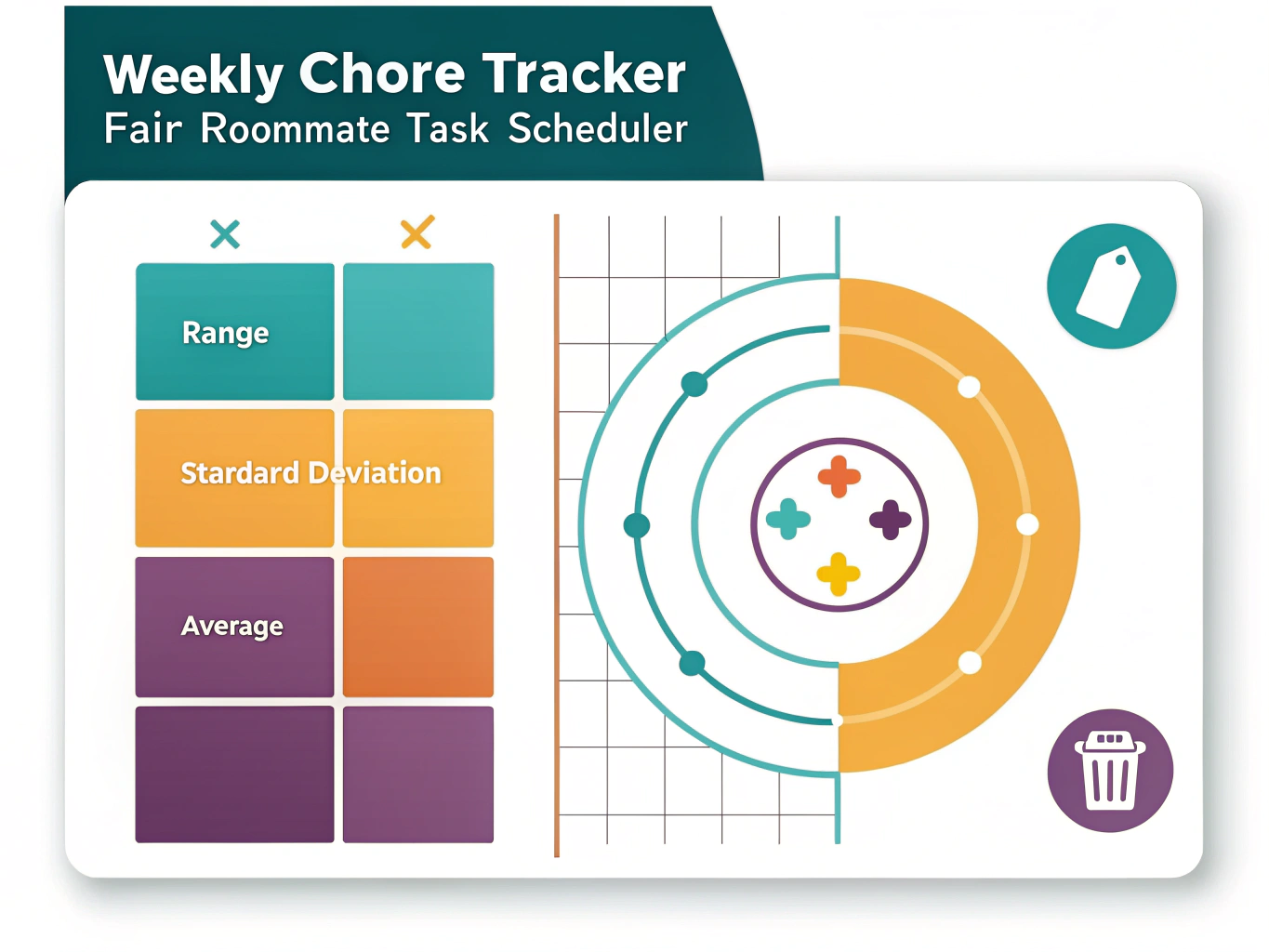Weekly Chore Tracker
Manage roommate chores fairly with flexible week swapping
Setup
Enter one roommate name per line
Enter one chore per line
Select the Monday to start the schedule
Format: Chore Name: Weight (higher numbers = more effort)
Create a fair chore schedule for all roommates
Swap History
Is this tool helpful?
How to Use the Weekly Chore Tracker
Start by entering your roommate names in the first text area, with one name per line. For example, you could enter “Sarah”, “Michael”, “Jessica”, and “David” for a four-person household.
Next, list your chores in the second text area. Try specific tasks like “Vacuum Living Room”, “Clean Bathroom”, “Take Out Garbage”, and “Kitchen Deep Clean” rather than vague descriptions.
Select your start date by clicking the calendar field. The tool automatically suggests the upcoming Monday, but you can choose any Monday that works for your household schedule.
The chore weights section lets you assign difficulty levels to different tasks. Enter weights like “Kitchen Deep Clean: 3” and “Take Out Garbage: 1” to reflect that some chores require more time and effort than others.
After clicking “Generate Schedule”, you’ll see your complete rotation plan. The current week appears highlighted in yellow, making it easy to see who handles what this week.
Use the swap section when someone needs to trade weeks. Select the two weeks you want to swap, choose which roommates are trading, and click “Perform Swap”. The tool automatically updates the schedule and tracks the change.
Smart Roommate Chore Management Made Simple
Managing household chores fairly among roommates creates one of the most common sources of tension in shared living spaces. You need a system that tracks who does what, when they do it, and ensures everyone contributes equally over time.
This weekly chore tracker eliminates guesswork and arguments by creating a transparent, flexible scheduling system. You can set up rotations, swap weeks when needed, and monitor fairness through built-in statistics that show exactly how much work each person has completed.
The tool addresses the core challenge of roommate chore management: maintaining fairness while allowing flexibility. Unlike rigid schedules that break down when life gets complicated, this tracker adapts to your real-world needs while keeping everyone accountable.
Key Benefits for Household Harmony
- Prevents disputes by providing clear, objective tracking of who does what
- Accommodates schedule changes through the flexible week-swapping feature
- Ensures long-term fairness with statistical monitoring and weight-based chore assignments
- Saves time by eliminating weekly negotiations about chore assignments
- Maintains accountability through permanent swap history and visual progress tracking
Understanding the Scheduling Algorithm
The tracker uses a round-robin system that automatically rotates chores among roommates each week. This ensures everyone gets experience with different tasks and prevents anyone from being stuck with the same chore indefinitely.
Basic Rotation Mathematics
For households with equal numbers of roommates and chores, the pattern repeats perfectly. When you have different numbers, the system uses a mathematical approach to ensure fair distribution:
$$\text{Assignment Week} = (\text{Week Number} + \text{Chore Offset}) \bmod \text{Number of Roommates}$$This formula ensures that over time, everyone handles each type of chore roughly the same number of times, even when swaps occur.
Weighted Fairness Calculations
When you assign different weights to chores, the system calculates total effort rather than just counting tasks. A roommate who does three “light” chores might contribute the same total effort as someone doing one “heavy” chore.
$$\text{Total Effort} = \sum_{\text{all chores}} (\text{Chore Count} \times \text{Chore Weight})$$Fairness Statistics Explained
The tool provides three key metrics to help you monitor whether your chore distribution remains fair over time.
Range Measurement
Range shows the difference between the roommate who has done the most work and the roommate who has done the least. Lower numbers indicate better fairness. A range of 0-1 means excellent balance, while ranges above 3 suggest you need more swaps to even things out.
Standard Deviation Analysis
Standard deviation measures how much individual workloads vary from the average. Values below 1.0 indicate good balance, while higher values suggest some roommates are carrying more of the load than others.
Gini Coefficient Assessment
The Gini coefficient provides an overall inequality measure, where 0 represents perfect equality and 1 represents maximum inequality. Household chore systems typically achieve Gini values between 0.05 and 0.15 when working well.
Strategic Swapping for Maximum Flexibility
The swap feature goes beyond simple schedule changes. It maintains long-term fairness by tracking every exchange and automatically updating the “Who’s Up Next” recommendations based on current contribution levels.
Smart Next-Up Recommendations
After each swap, the system recalculates who should handle each chore type next. These recommendations prioritize roommates who have done less work recently, helping maintain balance even as schedules change.
Swap History Tracking
Every swap gets recorded with timestamps and details. This creates accountability and helps resolve any disputes about who agreed to trade what. You can review the complete history to understand how your household’s chore balance has evolved over time.
Optimizing Your Household Chore System
Start with a two-week trial period to see how the basic rotation works for your household. Pay attention to which chores create bottlenecks or complaints, then adjust the weights accordingly.
Consider seasonal variations in your chore list. You might add “Shovel Driveway” in winter or “Pool Maintenance” in summer, adjusting the rotation to accommodate these temporary changes.
Review your fairness statistics monthly. If the range consistently exceeds 2.0 or the Gini coefficient rises above 0.20, schedule some strategic swaps to rebalance the workload distribution.
Advanced Household Management Tips
- Group related tasks like “Kitchen Cleaning” to include dishes, counters, and appliances
- Set realistic weights based on actual time requirements rather than perceived difficulty
- Plan swaps in advance for known schedule conflicts like work trips or exam periods
- Use the visual chart during household meetings to discuss workload balance objectively
- Adjust the system quarterly as household routines and preferences evolve
This systematic approach transforms chore management from a source of household tension into a smooth, fair process that adapts to everyone’s changing needs while maintaining long-term balance.
Important Disclaimer
The calculations, results, and content provided by our tools are not guaranteed to be accurate, complete, or reliable. Users are responsible for verifying and interpreting the results. Our content and tools may contain errors, biases, or inconsistencies. Do not enter personal data, sensitive information, or personally identifiable information in our web forms or tools. Such data entry violates our terms of service and may result in unauthorized disclosure to third parties. We reserve the right to save inputs and outputs from our tools for the purposes of error debugging, bias identification, and performance improvement. External companies providing AI models used in our tools may also save and process data in accordance with their own policies. By using our tools, you consent to this data collection and processing. We reserve the right to limit the usage of our tools based on current usability factors.







